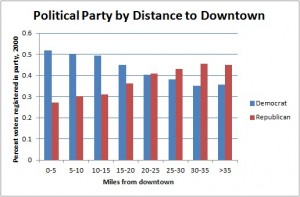Matthew Holian and I will soon release a new Working Paper that examines how center city residents and suburban residents differ with respect to their preferences over government regulation focused on transportation policy (think of gas taxes and bullet trains). Â We recognize that center city residents and suburbanites are not clones. Â The graph below (based on California data from the year 2000) highlights that conditional that you live between 0 and 5 miles from a California center city downtown, your probability of being a registered Democrat is over 50% while your probability of being a registered Republican is roughly 25%. Â These numbers do not add up to 100% because there are many other parties and many voters who do not register with a party.
Note the monotonic patterns for both groups up to 35 miles from the CBD! Â Â The median voter is likely to live in the 15 to 30 mile range. Â What transportation policies does she want? Â When Democrats live in the suburbs, do they demand the same policies as their Republican neighbors? Â When Republicans live downtown, do they demand the same policies as their Democrat neighbors?

I think the answers are likely to be as surprising as the graph but I’d be delighted to be wrong. A more interesting question to me — and for policy makers I would think — is whether center city Dems (or Reps) want similar transportation policies as suburban Dems (or Reps). I hope you’ll be differentiating between regional and local initiatives.
Here in Atlanta last year we had a major transportation referendum (a mix of local and regional projects) that got voted down for a variety of reasons, but prominent among them was suburbanite fears of the “crime element” coming out for a visit.
Are these results correcting for income?
That’s an interesting way to look at it, thank you Matt.
A true luxury is living near a large city center in a one car per adult household with a curb cut.
Those of us who enjoy this antisocial and impractical luxury are generally super-regular voters and easily mobilized to defend it.
Transportation planners need to either come up with something we won’t veto, or else be swift and sneaky, which is hard when large public capital investments are at issue.
Here in LA, they are good at the sneaky part, but I think it’s a mistake in the long term. Thanks to the MTA, I am now against carpool lanes (b/c they are really for “congestion pricing”). Though I was never that wild about them for safety reasons. And it’s the same when they put in a subway, and only afterwards tell people that it means a real loss of control (which in LA, you wouldn’t even think were still possible) over local planning.
I think when our leaders in effect lie to us, they poison the well for the next time they want something. I think the people who tend to vote also tend to have the longer memories. I am a bit sorry Measure J didn’t pass, but I also hope it leads to some soul-searching. Though, it probably won’t.
This is going to take some time to digest.
As a liberal, living it a dense, urban environment, I have my own bias, that I try to account for. (I probably don’t.)
But I wanted to say, thank you. This is great. Pardon me, fucking awesomeness. The sort of information that lets us have a better conversation in the future.
If it isn’t absurd to say, allow me to say, Rock On.